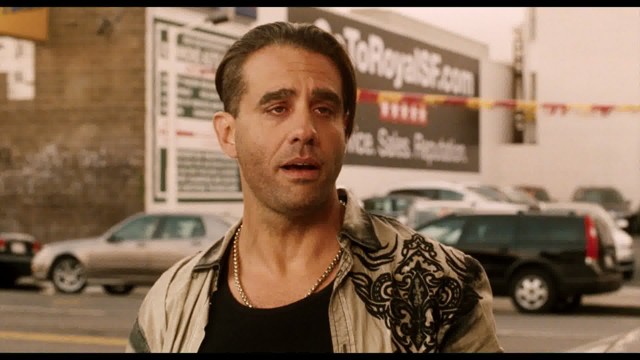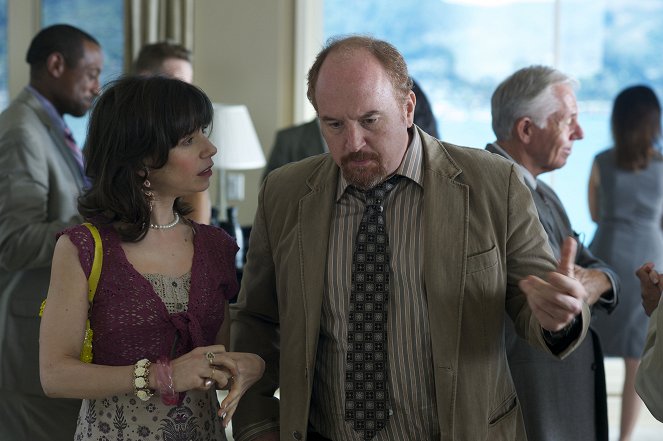Director:
Woody AllenGuión:
Woody AllenCámara:
Javier AguirresarobeReparto:
Cate Blanchett, Alec Baldwin, Sally Hawkins, Bobby Cannavale, Andrew Dice Clay, Peter Sarsgaard, Louis C.K., Alden Ehrenreich, Michael Stuhlbarg (más)Streaming (1)
Sinopsis(1)
Cuando su vida entera se desmorona, incluyendo su matrimonio con Hal (Alec Baldwin), un adinerado hombre de negocios, la elegante Jasmine (Cate Blanchett), conocida personalidad de la alta sociedad de Nueva York, se muda al modesto apartamento de su hermana Ginger (Sally Hawkins) en San Francisco para intentar recuperarse y recomponer su vida. (Warner Bros. España)
(más)Videos (3)
Reseñas (10)
«¿Qué pasará cuando Woody no esté?» - una vez comentó cleopatra una película de Woody. Yo lo digo casi siempre cuando se menciona alguna película suya. Nadie más escribe tales diálogos. Nadie más sabe dibujar a los personajes y elegir a los actores de manera tan acertada que disfruten de cada réplica por honorarios mínimos. La película es humana, inteligente, sensible, presentada con visión y una leve ironía. Esta vez hasta triste, compadeciendo con el personaje principal.
()
Woody Allen gets absolute recognition mainly for the fact that a somewhat overblown comedy was expected based on the premise and the trailer, but instead, he delivers an unexpected blow to the audience. Not to say that the occasionally typical dialogues don't appear, but the rest is for the audience one of Allen's most painful screenplays. In fact, Blue Jasmine cuts deep into the lifestyle, the syndromes of today's era, and relationship deadlocks, hitting the mark. The greatest credit for that goes to Cate Blanchett, who, under the Master's guidance, as expected, grows into a goddess.
()
It’s always the same with me and Woody Allen. Whenever I go see his movie, I don’t know whether I’ll be satisfied, or whether I’ll be rolling my eyes in disbelief. Once, I was pleasantly surprised, another time I would love to slap him across the face for his choice of topic to base his movie on. But he’s got the name and reputation for it and I need to respect that. But his dialogue-based movies don’t always sit well with me and it was the case with this movie as well. Cate Blanchett looks pretty likeable in the poster. Overall, the poster makes it look as if it was going to be another good dialogue-based movie with interesting characters with none other but Cate in the lead. She literally radiates grace. But then the movie started and I got bored. I gradually got to meet the main characters. I started getting to know Cate, who kept trying to escape reality. I got to know her friend, her boyfriend, who looked like Till Lindemann of Rammstein and not much was happening really. I’m still not in the mood where I would be enjoying every single dialogue that appears in the movie. But Woody’s movies are based on that. And also on the setting of the story. But with this one I have to admit that I may not have seen a worse depiction of New York. That’s how simple it is. This movie is really bad, and not even the ending can save that. You see at that point the entire story leans on everyday reality and all the characters get an epileptic fit. At least Woody left in a message. And the message is that the most important thing is to keep it all together.
()
Like the first part of Kieslowski’s Three Colours trilogy, Allen’s tragicomic extension of A Streetcar Named Desire is in a blue mood. Blue, which for the emotionally fragile female protagonist is a symbol of tranquillity, is inserted into the film with frequent shots of the sea (which may be one of the reasons that Allen shot the film in San Francisco), and blue is also the colour of the moon in the song that Jasmine nostalgically recalls. The clear classification of the characters in Tennessee Williams’s play gives way to the destabilisation of all roles. With minor success, the two sisters seek their place among men. They are just as unclassifiable in terms of their nature as the film itself is terms of its genre as it oscillates between bitter comedy and pure tragedy. The insertion of current events through numerous flashbacks contribute to the “dual” structure of the narrative. Allen thoughtfully deals with the opposing “before” and “after” lifestyles and, more generally, the lifestyles of the rich and the poor (so the film could be credited with having a slight element of social criticism), and with the contradiction of Jasmine as passive prey and active woman/breadwinner. However, none of the positions and oppositions is permanent or impervious, so the protagonist does not cease to be dependent on others and does not definitively renounce her manners of a well-to-do lady upon arriving at her sister’s place. Jasmine’s sister once looked up to her; if Jasmine wants to survive in her new surroundings and conditions, she must now look up to her sister (both figuratively and literally, as Ginger dominates the shots on her own turf, while Jasmine is a passive beauty and a pampered queen in the world of luxury that her husband provided for her). The restrained camerawork (forget the neuroticism of Husbands and Wives; this film has a much smoother style) helps us to find our bearings in this shifting of forces and changing of roles, which are made authentic by the performances of the two lead actresses (the men are also superbly cast, but they certainly don’t play first fiddle, as they more or less there just to help move things along). Blanchett brings a theatrical loftiness to her portrayal of Jasmine, who literally cannot step out of here role, thus creating a sharp contrast with the more down-to-earth acting of the equally convincing Hawkins. Despite the film’s occasional formalistic rigidity irritating reluctance to give up on making jokes in places and the forcible insertion of themes involving crises, Blue Jasmine is, in comparison with Allen’s previous films, mostly just variously amusing puns, a decently complex study of character collapse and, after quite a long time, a Woody Allen film that the director spent enough time working on that I want to see it more than once. 75%
()
The best Allen in recent years... There is actually only one thing that hurts this film - when one perceives it as another of the director's parodies and caricatures of superficial petty bourgeoisie and snobbery. But this film is much more of a tragedy about lies and endless hypocrisy, a tragedy of a character who cannot be himself, even if he is himself. The functional mirror structure, in which Allen places a (seemingly) comic monologue at the beginning and a clearly tragic monologue at the end, well reflects the path that the viewer must find with the withdrawn, unpleasant and unsympathetic protagonist. Jasmine has a hard time laughing / smiling, and it's hard to take a clear position on her and it's hard to judge what role she should specifically play in the testimony - is it a self-parody, an ironic smile to superficiality, a serious character...? The protagonist is as unclassifiable as the chameleon and in every detail the brilliant performance of Cate Blanchett, who undoubtedly played her life role on the verge of sacrificing her appearance (in some scenes she is not even recognizable). And the bitter old man Allen unfolds a scathing anti-tale about a crumbling life so consistently and ruthlessly that I had to collect myself for a few hours after the film ended. It's good to know that Woody can still do that. And that he is still able to make a risk-evoking film like the Coens’ A Serious Man (and not only because Michael Stuhlbarg is running around in this film again). Dark, sardonic, brilliant, one of the surprises of the year.
()



Anuncio